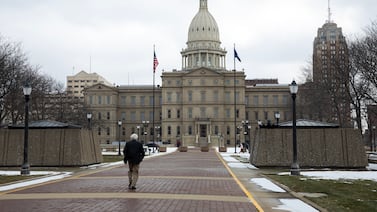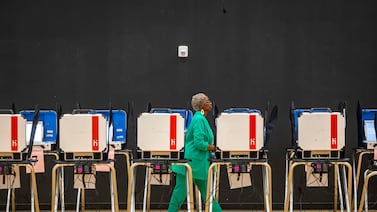Votebeat is a nonprofit news organization reporting on voting access and election administration across the U.S. Sign up for Votebeat Michigan’s free newsletter here.
The Michigan Department of State is trying to send along a portion of the voter registration data requested by the U.S. Justice Department, but one state official says it’s waiting for the federal government to tell it how.
The state is sending only the part of the voter roll that is accessible to anyone, including names and voting history. It is not including Social Security numbers or other private information, citing federal laws that ban it from sharing that.
But Michigan officials say they can’t send anything if Justice Department officials don’t explain how to securely transfer the records.
The qualified voter file, or QVF, is available to anyone who files a Freedom of Information Act request with the Michigan Department of State. The file is massive — it was nearly three gigabytes when Votebeat last requested it in June, even before including additional documents needed to interpret it — and can be difficult to share. When a member of the public asks for the records, for example, the state provides it in a series of compressed files through its FOIA portal.
The federal government asked for the records to be submitted either by email or through the Justice Department’s file-sharing system. Sending the qualified voter file by email is technically possible, but it’s not secure, and the file size makes it difficult. The Michigan Department of State has been asking the Justice Department since last week how to access its file-sharing system and has received no response, Angela Benander, spokesperson for the Department of State, told Votebeat on Tuesday.
The files, she said, are “ready to go over” as soon as MDOS officials get a username and password.
The Justice Department did not respond immediately to a request for comment from Votebeat.
Communications between the Department of State and the Justice Department show that Khyla Craine, chief legal director for the Department of State, requested information on how to transmit information through the DOJ system. The email, shared with Votebeat, was sent Aug. 21 to Timothy Mellett, a trial attorney with the DOJ’s civil rights division who has been actively involved in other voting-related legal affairs.
Neither Mellett nor any of his colleagues had responded as of Tuesday, Benander said.
“It seems strange that they’re not prepared to help us,” she added.
Other states have also declined to share personally identifying information. Pennsylvania responded to the DOJ similarly last week, offering only its own publicly available file. It is not clear if Pennsylvania had any similar problems sharing its data.
The Justice Department has shown a willingness to sue for access to the more detailed information, as it did in Orange County, California, earlier this summer. But states have argued that sharing the information would be a violation of federal privacy law.
In Michigan, Benander said, lawyers specifically cited the Drivers Protection Privacy Act, which bans states from sharing personal information gathered through the DMV and connected to motor vehicle records. Other laws may also apply, including the Privacy Act of 1974, which requires the federal government to provide a notice of why it is collecting information and how it plans to store it.
Hayley Harding is a reporter for Votebeat based in Michigan. Contact Hayley at hharding@votebeat.org.




